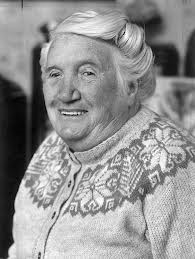
“I have never had any personal ambitions. I have but one: to make my contribution to destroy the capitalist system.”
Mary Brooksbank
Mary Brooksbank (1897-1978) poet-musician and political activist, born in Aberdeen to poor people, began working at the Dundee spinning mill at the age of 12-13 as a “doffer” and worked there until she was twenty. In 1920 Mary Brooksbank joined the Communist Party and participated in demonstrations and clashes for workers’ rights and was imprisoned several times.
After the untimely death of her husband Mary Brooksbank resumed working in spinning mills until 1947 when, at the age of 50, to take care of her sick mother, she resumed her activity as a violinist and singer, writing songs and poems about the life of workers in textile factories, on women’s lives and social injustices, political events and literature.
DUNDEE’s FOLK CLUB
In the late 1960s Mary Brooksbank was invited to television and radio broadcasts in Scotland and in the folk clubs of Dundee; is described by Hamish Henderson as “a heroine of the working class movement in Dundee, and a free-spoken, free-thinking old rebel who got thrown out of the CP for denouncing Stalin in the early thirties.“
Mary Brooksbank (1897- 1978) poetessa-musicista e attivista politico, nata a Aberdeen da povera gente iniziò a lavorare al filatoio di Dundee all’età di 12-13 anni come “doffer” e ci lavorò fino ai vent’anni. Nel 1920 Mary Brooksbank aderì al partito comunista e partecipò alle manifestazioni e agli scontri per i diritti dei lavoratori e fu più volte imprigionata.
Dopo la morte prematura del marito Mary Brooksbank riprese a lavorare nei filatoi fino al 1947 quando, per occuparsi della madre malata, all’età di 50 anni riprende la sua attività di violinista e cantante mettendosi a scrivere canzoni e poesie sulla vita dei lavoratori nelle fabbriche tessili, sulla vita delle donne e le ingiustizie sociali, gli eventi politici e la letteratura.
I FOLK CLUB DI DUNDEE
Alla fine degli anni 60 Mary Brooksbank viene invitata alle trasmissioni televisive e radiofoniche in Scozia e nei folk club di Dundee; viene descritta da Hamish Henderson come “a heroine of the working class movement in Dundee, and a free-spoken, free-thinking old rebel who got thrown out of the CP for denouncing Stalin in the early thirties.”
“Mary Brooksbank, one of the most decent human beings you could ever be fortunate enough to meet, paid dearly for the ideals she embraced.
A life-long communist and humanist, she was expelled from the Communist Party in 1936 or ’37 for daring to suggest that ‘Uncle’ Joe Stalin was a brutal fascist dictator who enslaved millions of his fellow-countrymen and women and worked them to death.
Black-listed by mill owners for her efforts to organise unions, and and therefore unable to obtain legitimate employment, she took to street-singing to keep herself and her family alive, and kept this up into her 60s.
She continued to address public meetings, and was arrested on one occasion and jailed for sedition. It is no coincidence that the local politicians waited until she was safely dead before granting her the ‘recognition’ of placing her name on any building. In the days before Consumer Protection, Legal Aid or Citizens Advice Bureaux she campaigned tirelessly on behalf of those unfortunates, less articulate than herself, who found themselves embroiled in battles with the Police or unscrupulous landlords, employers or moneylenders.
The path to her front door was well-worn.
How she found time to write and collect songs and poems I do not know.
In the early 1970s, while she sat at home in Mid Craigie, unwell and suffering the after-effects of a stroke, Luke Kelly, on stage with the Dubliners at the Caird Hall, berated the audience for allowing such a gem as Mary Brooksbank to languish in obscurity.”
[thread in Mudcat.org]
“Mary Brooksbank, uno degli esseri umani più dignitosi che potresti essere abbastanza fortunato da incontrare, ha pagato a caro prezzo per gli ideali che ha abbracciato.
Comunista e umanista per tutta la vita, fu espulsa dal Partito Comunista nel 1936 o nel ’37 per aver osato suggerire che lo ‘zio’ Joe Stalin era un brutale dittatore fascista, che schiavizzò milioni di suoi connazionali e donne e li fece lavorare fino alla morte .
Inserita nella lista nera dei proprietari dei filatoi per i suoi sforzi nei sindacati, e quindi incapace di ottenere un impiego legittimo, ha iniziato a cantare in strada per mantenere se stessa e la sua famiglia, e ha continuato a farlo fino ai 60 anni.
Ha continuato a parlare alle riunioni pubbliche ed è stata arrestata in un’occasione e incarcerata per sedizione. Non è un caso che i politici locali abbiano aspettato che fosse morta, prima di concederle il “riconoscimento” e apposto il suo nome su ogni edificio. Nei giorni precedenti la tutela dei consumatori, l’assistenza legale o gli uffici di consulenza per i cittadini, ha condotto una campagna instancabile a favore di quegli sfortunati, meno eloquenti di lei, che si sono trovati coinvolti in battaglie con la polizia o proprietari senza scrupoli, datori di lavoro o usurai. Il sentiero per la sua porta d’ingresso era consumato. Come abbia trovato il tempo per scrivere e raccogliere canzoni e poesie non lo so.
All’inizio degli anni ’70, mentre sedeva a casa a Mid Craigie, malata e colpita dai postumi di un ictus, Luke Kelly, sul palco con i Dubliners alla Caird Hall, rimproverò il pubblico per aver permesso a una gemma come Mary Brooksbank di languire nell’oscurità. “
LINK
http://www.grahamstevenson.me.uk/index.php?option=com_content&view=article&id=70:mary-brooksbank&catid=2:b&Itemid=98
http://citylifedundee.com/2015/02/15/mary-brooksbank-oary-dundees-first-lady/
http://www.dundeewomenstrail.org.uk/womens-trail/mary-brooksbank/
Dalla raccolta di Mary Brooksbank (1897-1978) “Sidlaw Breezes” (1966) una serie di poesie e canzoni sulla dura vita delle lavoratrici nei filatoi di Dundee, Scozia: Dundee jute mill songs
